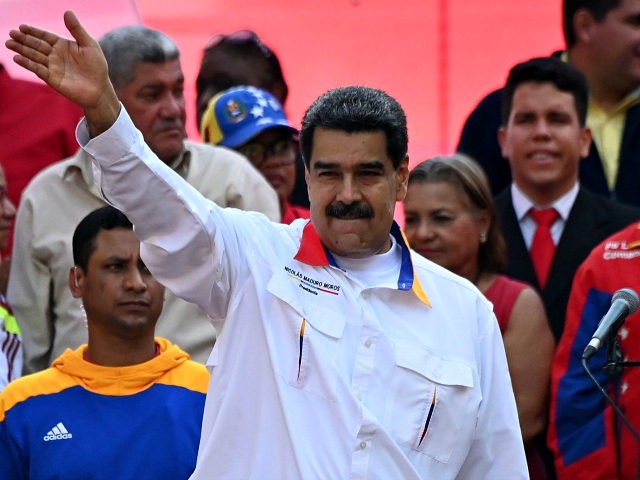Six Citgo oil executives, five of them American citizens, will stand trial on charges of embezzlement and conspiracy after a year and a half in prison without charges in socialist Venezuela, Nicolás Maduro’s supreme court revealed on Monday.
Citgo is the American arm of Petróleos de Venezuela (PDVSA), the state-run oil company. The men – José Ángel Pereira Ruimwtk, Tomeu Vadell Recalde, Alirio Zambrano, Jorge Toledo, Gustavo Cardenas, and José Luis Zambrano – stand accused of trying to wrongfully use Citgo stock to keep the company afloat. According to Texas NBC affiliate KRIS, the charges stem from “a never-executed proposal to refinance about $4 billion in Citgo bonds by offering as collateral a 50-percent stake in the company – which is the property of Venezuela’s state-owned oil company, PDVSA.”
Prior to the charges revealed Monday, the families of those detained said they were not charged with any crime and did not know how to receive due process from Maduro’s socialist dictatorship. Maduro had described their crime as “treason,” KRIS noted, but the courts did not charge them with treason, nor did Maduro provide any explanation for how the men’s alleged actions fit the legal definition of the term. The families say the men are innocent of any crime.
Maduro’s regime has a history of using Americans as hostages in disputes with the United States. It held an American citizen, Joshua Holt, in its notorious Helicoide political prison for years on charges of stockpiling weapons for a rebellion against the regime, but witnesses say they saw police openly plant weapons in Holt’s home before arresting him.
The Venezuelan Supreme Court published a notice Monday listing the suspects and charging them with “embezzlement, conspiracy between officials and contractors, money laundering, and conspiracy to commit a crime against the Venezuelan state, the public trust, and Citgo.” The judge presiding over the case did not set a date for their trial, meaning the prisoners have no indication of when, or if, the trial will occur. He had canceled 15 hearings on the case before the one on Monday.
The lack of information resembles their initial arrest in November 2017, when PDVSA sent for the men for an alleged “company meeting,” according to the family of Tomeu Vadell, Citgo’s vice president of refining. The meeting was a trap; Maduro’s police immediately arrested them upon landing in the country.
The anti-communist site Babalú Blog noted that the case of the “Citgo 6” has largely remained in local news spheres in Texas with little international coverage, despite the 18 months the men spent in prison with no charges to their names. Vadell’s family issued a statement to local media in the United States calling the hearing that announced the charges a “sad spectacle and a travesty of justice.” They, and the families of all six of those imprisoned, deny the charges.
The family of Alirio Zambrano has also spoken out, denying any charges and insisting that they “have seen absolutely nothing that indicates any shred of evidence against them.”
Louisiana’s KPLC TV reported Tuesday that Vadell’s family is extremely worried about his health, as he appeared to have lost significant weight when the family visited him in prison. Previous local news reports describe Vadell as having lost as much as 60 pounds and all of his hair.
“He prays a lot, he reads, and he exercises daily. And he just tries to stay strong because he says, he always says, he’s so positive, he says, ‘One day this happened and I know one day out of the blue, they’re going to let us out because I have the truth on my side,'” wife Dennysse said.
The “Citgo 6” case resembles the struggle of American Joshua Holt to get home after being accused of planning an insurrection. Holt had traveled to Venezuela to marry his wife, Thamara Caleño, and lived with her while they were processing their marriage. In that time, Maduro police stormed into their apartment and arrested them, claiming to find a firearms stockpile. Neighbors said they saw police plant the weapons in the apartment.
During his ordeal, Holt’s family told media that he lost significant weight in prison and was subject to physical and psychological abuse. In 2018, shortly before his release, Holt witnessed a prisoner revolt in the Helicoide, the former shopping mall Maduro’s regime uses as a political prisoner. Holt managed to release a video from prison in which he said the guards had threatened his life amid the uprising.
“Help me please united states [sic], how long do I have to suffer unjustly in this place?” he wrote on the Facebook post sharing the vide. “They want to kill me and paint the walls with my blood. I am a political prisoner, and they won’t let me free. They won’t give me a true trial.”
Maduro released Holt in April 2018 after significant pressure from the Trump administration.

COMMENTS
Please let us know if you're having issues with commenting.